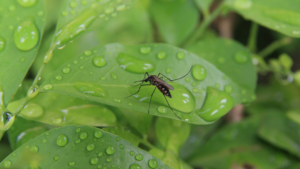
Mosquito Control Challenges: Tackling Florida’s Persistent Problem
Florida is known for its warm, humid climate, making it a perfect breeding ground for mosquitoes. These pesky insects are more than just annoying; they can also pose health risks. Mosquito populations thrive in areas with standing water and abundant plant life, which are common in Florida’s lush environment.

The high number of mosquitoes in Florida affects everyday life. Outdoor activities become less enjoyable when you’re constantly swatting away these insects. Their presence can also make it difficult to enjoy your backyard or pool area. Worse, mosquitoes carry diseases like West Nile virus and dengue fever, which can have serious health impacts.
Addressing the mosquito problem in Florida requires a combination of understanding the issue and implementing effective control measures. Natural solutions are an excellent way to manage mosquitoes without introducing harmful chemicals into the environment. In the following sections, we’ll delve into the specifics of the mosquito problem in Florida, the effects on health and lifestyle, and explore practical, natural control methods. With the right approach, you can significantly reduce mosquito populations and improve your quality of life.
Understanding the Mosquito Problem in Florida
Florida’s climate is a haven for mosquitoes, making the problem particularly severe. The state’s warm temperatures and high humidity create ideal conditions for mosquito breeding. Mosquito eggs hatch in standing water, which is plentiful during Florida’s rainy season. Ponds, bird baths, clogged gutters, and even puddles provide ample breeding grounds.
Several types of mosquitoes thrive in Florida, including the Aedes, Culex, and Anopheles species. Each type carries its own set of concerns. For instance, Aedes mosquitoes can carry diseases like Zika and dengue fever, while Culex mosquitoes are known for spreading West Nile virus. The frequent presence of these mosquitoes increases the risk of disease transmission throughout the state.
Understanding the mosquito life cycle helps address the problem effectively. Mosquitoes lay eggs in water, and the larvae develop into adult mosquitoes within days. This rapid life cycle means that a small amount of standing water can quickly turn into a mosquito breeding hotspot. Effective mosquito control involves breaking this cycle by eliminating standing water and employing strategies to reduce mosquito populations.
Effects of Mosquitoes on Health and Lifestyle
Mosquitoes are more than just a nuisance; they significantly impact health and daily life. Mosquito bites cause itching and discomfort, making it hard to enjoy outdoor activities. This can be particularly problematic for families who want to spend time in their backyards or visit parks and nature trails.
The health risks associated with mosquitoes are a major concern. These insects are vectors for diseases like Zika, dengue fever, West Nile virus, and malaria. Infected mosquitoes can transmit these diseases to humans through their bites. Symptoms range from mild flu-like conditions to severe neurological damage, making some mosquito-borne diseases life-threatening.
Aside from health impacts, mosquitoes can also affect economic activities. Outdoor businesses, such as restaurants with patios, might see fewer customers because of mosquito problems. Tourism can also suffer, as tourists may avoid areas known for heavy mosquito infestations. Addressing mosquito issues is essential for both public health and local economies.
Understanding these effects underscores the importance of effective mosquito control measures. By managing mosquito populations, we can improve quality of life and reduce health risks, allowing for safer and more enjoyable outdoor experiences.
Natural Solutions for Mosquito Control
Controlling mosquitoes naturally is a great way to reduce their presence without harming the environment. Several methods can be used to make your surroundings less appealing to mosquitoes.
1. Remove Standing Water: Mosquitoes lay eggs in stagnant water. Regularly check and empty containers like flower pots, bird baths, and gutters. This simple step can drastically reduce mosquito breeding sites.
2. Use Natural Repellents: Plant mosquito-repellent plants, such as citronella, lavender, and marigolds, around your home. These plants help keep mosquitoes at bay while adding beauty to your garden.
3. Introduce Predators: Encourage the presence of natural predators like dragonflies and bats. These animals feed on mosquitoes and can help control their population.
4. Home-Made Traps: Create mosquito traps using organic materials. A simple mixture of sugar, yeast, and water can attract and trap mosquitoes, reducing their numbers.
5. Essential Oils: Use essential oils like eucalyptus, lemon, or lavender as natural mosquito repellents. Apply these oils on your skin or use them in diffusers to keep mosquitoes away.
Employing these natural solutions can help create a safer, mosquito-free environment without resorting to chemical treatments.
Best Practices for Long-Term Mosquito Management
Maintaining an active approach is key to keeping mosquito populations under control in the long term. Consistent practices ensure that your efforts remain effective over time.
1. Regular Inspections: Frequently inspect your property for standing water and other mosquito breeding sites. Make it a habit to eliminate these areas.
2. Use Mosquito-Repellent Products: Consider using natural mosquito-repellent products, such as candles, sprays, and lotions, especially during peak mosquito season.
3. Maintain Vegetation: Keep your lawn and garden well-trimmed. Overgrown plants and grass can provide shelter for mosquitoes.
4. Install Screens: Ensure that windows and doors have intact screens to keep mosquitoes from entering your home.
5. Hydrate Wisely: Water your plants and lawn in the morning. Evening watering can create damp conditions that attract mosquitoes.
Implementing these best practices will help control mosquito populations effectively, ensuring a comfortable and healthy environment.
Conclusion
Mosquitoes pose significant challenges in Florida, affecting health and lifestyles. However, understanding the problem and using natural solutions can significantly reduce their presence. Regular inspections and preventive measures keep your surroundings mosquito-free, promoting a safer and more enjoyable outdoor experience.
Green Queen is committed to providing non-toxic pest control solutions in the Atlanta area. For effective and environmentally friendly mosquito control, contact Green Queen today. Let’s work together to create a mosquito-free environment for your family and community.
